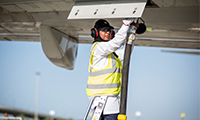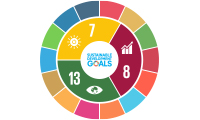UN sustainable development goals
The UN’s 17 sustainable development goals (SDGs) seek to address the world’s biggest challenges, including ending poverty, improving health and education, making cities sustainable and tackling climate change.
Governments are responsible for prioritising and implementing approaches that meet the SDGs, and many have started to articulate plans to meet the goals. But achieving these tasks will require unprecedented collaboration and collective action with business and civil society.
We welcome the SDGs and believe we have an important role to play in supporting the ambitions.
All the SDGs are relevant to Shell operations to varying degrees and we are already contributing to many of these goals. In 2018, following a review by senior executives, we decided to focus on supporting the three goals where we can make the greatest contribution: Goal 7 (Ensure access to affordable, reliable, sustainable and modern energy), Goal 8 (Decent work and economic growth) and Goal 13 (Climate action).
Goal 8 - Decent work and economic growth
Employment is a critical route out of poverty and towards prosperity. We provide jobs and follow applicable labour, health and safety standards. We encourage local businesses to be part of our supply chain, and seek to ensure our suppliers meet Shell standards. We work with governments and others to offer training to build local skills and expertise. We support entrepreneurs through various programmes, including the Shell LiveWIRE programme, which helps young people start their own businesses. We also contribute to economic growth by paying taxes and royalties to local governments.
Read more in the report and on shell.com:
Goal 13 - Climate action
We have an ambition to reduce the Net Carbon Footprint of the energy products we sell by around half by 2050, in step with society, towards meeting the goals of the Paris Agreement to keep the rise in global average temperatures to well below two degrees Celsius above pre-industrial levels. As an interim step, by 2035, and based on societal progress, we aim for a reduction of around 20% compared with 2016 levels. Our approach to calculating the Net Carbon Footprint covers emissions directly from Shell operations (including from the extraction, transport and processing of raw materials, and transportation of products), those generated by third parties who supply energy to us for production, and our customers' emissions from their use of our energy products.
Read more in the report and on shell.com:
- Climate change and energy transition
- Managing greenhouse gas emissions
- Advancing lower carbon options
- Shell Scenarios (see www.shell.com/scenarios)
- Shell Energy Transition Report (see www.shell.com/set)
- Climate change: an imperative to act (see www.shell.com/inside-energy)
Goal 7 - Ensure access to affordable, reliable, sustainable and modern energy
Today, around 1 billion people live without access to electricity. The same number live with unreliable or unsafe supplies of electricity. Access to reliable and safe energy is critical to enabling economic and social development and improving health, education and livelihoods. Goal 7 is crucial to achieving almost all the SDGs. For our part, we announced our ambition to provide a reliable electricity supply to 100 million people in the developing world by 2030. We continue to work on developing a longer-term strategy to achieve this ambition.
Read more in the report and on shell.com:
 Our people
Our people
 Sustainable development goals
Sustainable development goals
 About our data
About our data
 Electricity
Electricity